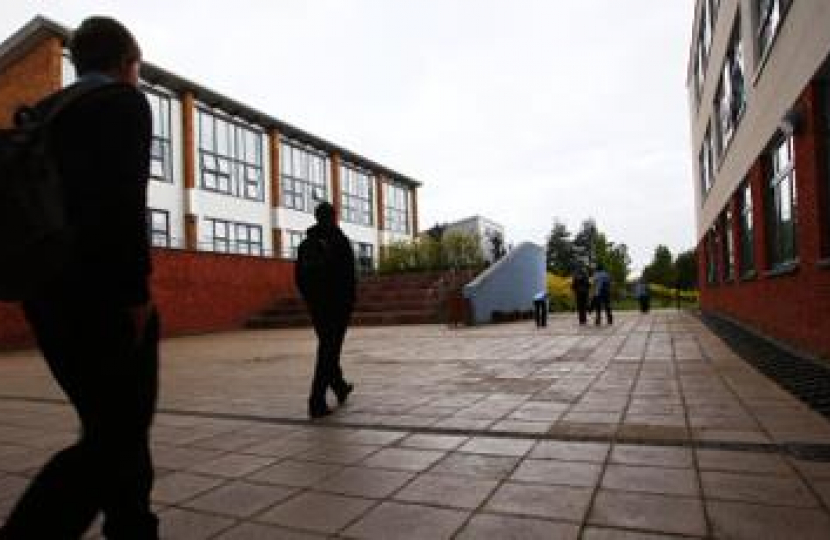
First reported in Conservative Home
Last week, the Department for Education (DfE) released not one, but two significant new policy documents – a White Paper on Schools and a Green Paper on children with special educational needs.
Published just hours apart, the White Paper and SEND Review together could form a bold and cohesive vision for our schools. At last, the Government has begun to provide a washing line for all the clothes pegs of different educational initiatives.
This joined-up thinking should be seen as just the start of a long-term plan for education. Our education system must be equipped, not only to recover from the challenges of Covid-19, but to address significant social injustices and to develop the world-class skills we need for a modern economy.
By social injustices, I mean those different cohorts of children such as children in care, those with special educational needs, and white-working class boys and girls from disadvantaged backgrounds who don’t have a level playing field when it comes to climbing the educational ladder of opportunity.
By skills, we need to make sure students can apply the knowledge they learn at school and are equipped for the fourth industrial revolution.
Early Years
If everyone is to be offered a fair chance to climb the ladder of opportunity, early years must be the starting point. The gulf between the life chances for disadvantaged pupils and their peers opens up early in life: around 40 per cent of the attainment gap at GCSEs has already emerged at the age of five.
Rather than redressing this issue of social injustice, the current early years provision entrenches disadvantage.
As schools returned this year, half of all children arrived at the primary school gates not ready to learn. This isn’t just a case of five-year-olds getting confused with the alphabet. A review published by Ofsted on Monday exposed a generation of toddlers failing to meet key developmental milestones.
Children are turning up to Reception wearing nappies, unable to speak, and reluctant to play with others.
Michael Gove’s Levelling Up White Paper set a mission for 90 per cent of young people to leave primary schools with expected literacy and numeracy skills. If that pledge is to be kept, there needs to be a radical plan to make sure that our country is the best to be born into.
The additional £500 million increase of funding to Family Hubs is a welcome start, but the Government should go further to re-shape our early years spending so that children from the most disadvantaged backgrounds have equal access to early years education.
In practice this would mean revising the eligibility criteria for free childcare and investing the savings to make a more generous offer.
Tuition
Any plan going forward must provide answers on how the Covid generation who have lost vital hours in school will be supported.
Given the strong evidence that tuition can boost pupils’ academic progress, the Department and the Prime Minister must stay firm in their commitment to the National Tutoring Programme (NTP).
But the NTP is not without fault. In our recent inquiry, the Education Select Committee went so far as to question if our catch-up programme is fit for purpose.
However, after I waged a long campaign in Parliament, Nadhim Zahawi and Robin Walker have listened and taken decisive action by ditching Randstad and giving money straight to schools. This decision will simplify the spaghetti junction of catch-up funding.
However, fixing the catch-up programme cannot just be about cash. The focus must be quality, quality, quality. Ofsted raised alarm over left-behind areas where schools cannot find enough decent tutors. We cannot afford to create a postcode lottery of tuition.
The Committee’s recent report – Is the Catch-Up Programme Fit For Purpose? – highlighted significant regional disparity of take-up of the NTP. By March 2021, it had reached 100 per cent of its target numbers of schools in the South West but just 58.9 per cet in Yorkshire and the Humber, and 59.3 per cent in the North West, meaning that tutoring was not always reaching the most disadvantaged pupils.
The Department must ensure that going forwards, there is a quality assurance framework in place for every tutor partner which means teachers can have confidence in the quality of provision for their pupils, wherever they may be.
Ghost children
One of the most grim consequences of school closures is the fact that 124,000 children have mostly not returned to school since they reopened. If we are not careful, there will be an Oliver Twist generation of ghost children lost to education and exposed to serious safeguarding concerns.
The fact that so many children have gone missing points to the glaring problems that existed in schools prior to the pandemic: that the system was unequipped to support the most vulnerable and marginalised young people.
Even with the recovery efforts, the response to severe absence has been piecemeal. Nearly 800 schools have an entire class worth of children missing and over 13,000 children in critical exam years have not returned to school.
The scale of this severe absence has become so big that teachers alone cannot solve this problem. The additional £5 million funding provided is important, but more needs to be done. The DfE should utilise the underspend from the Randstad contract to fund an additional 2,000 attendance advisers to work on the ground and get these children safely back into school.
Skills
I have previously written in ConHome to say that “schools” and “skills” should be the two most important words in the Government’s vocabulary. Employers from Harlow to Hartlepool need skilled young people to create an economy that works for everyone. The White Paper outlined a commitment to a knowledge-rich curriculum, but what about a skills-rich curriculum?
If the Government really want to deliver a skills revolution, the reformation must begin in schools.
The Lords Youth Unemployment Committee found that the English Baccalaureate and Progress 8 have restricted the national curriculum and created a system that stifles the development of digital, technical, and creative skills that our economy needs.
The Education Committee’s current inquiry on the Future of Post-16 Education, heard that while students in Britain do relatively well when it comes to reproducing subject matter knowledge, they have far greater difficulties in demonstrating practical ways of working and applying the knowledge they have learnt.
Andreas Schleicher, the OECD’s Director for Education and Skills, told the Committee that “in a world where the kinds of things that are easy to teach and to test are becoming easier to digitise and to automate, that is a significant risk”.
This is not an argument about ‘knowledge vs skills’. It is an argument which urges the need to see skills and knowledge go together, hand in hand. As the old saying goes, give a man a fish and you give him a meal; teach a man how to fish and you give him a meal for life.
The same can be said about knowledge and skills. It is important that children should learn the names of the fish in the river, but it is equally important that they know how to fish as well.
